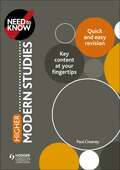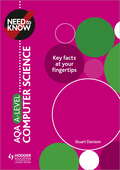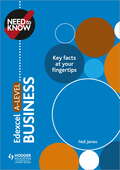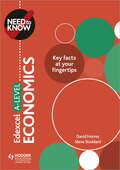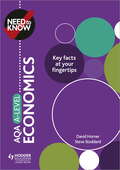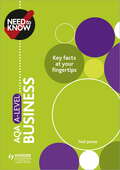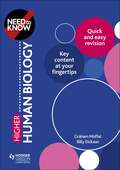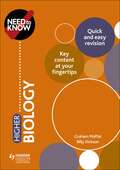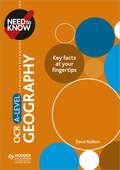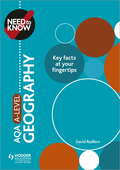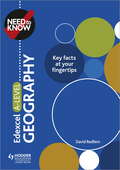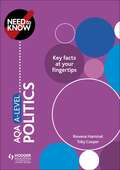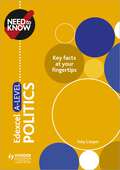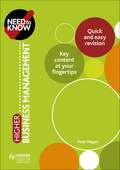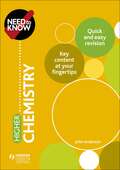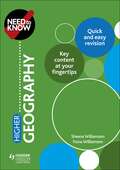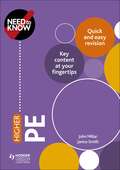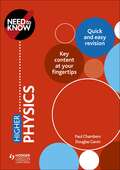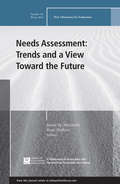- Table View
- List View
Need to Know: Higher Modern Studies Epub
by Paul CreaneyExam board: SQALevel: HigherSubject: Modern StudiesFirst teaching: September 2018 First exams: Summer 2019 What do you really need to know for the SQA Higher Modern Studies exam?This revision guide covers the essentials in just 112 pages, so it's perfect for early exam preparation or last-minute revision.- Find key content at your fingertips with quick summaries of the issues, processes and terminology that you need to understand- Get a better grade in your exam with tips on exam technique, mistakes to avoid and important things to remember- Revise and practise using end-of-topic questions and synoptic questions at the end of each section - with answers provided online- Benefit from the knowledge of experienced teacher Paul CreaneyThis book covers the following content:- Democracy in Scotland and the UK: All topics- Social Issues in the UK: Social Inequality and Crime and the Law- International Issues: Terrorism (World Powers) and The Development of Africa (World Issues)
Need to Know: Aqa A-level Computer Science Epub
by Stuart DavisonExam board: AQALevel: A-levelSubject: Computer ScienceFirst teaching: September 2015First exams: Summer 2017 Find what you need to know, when you need it, with key facts at your fingertips for AQA A-level Computer ScienceKeep this course companion by your side throughout your A-levels so you can check content, review your understanding, use quick tips for success and improve your exam performance.Written by an experienced teacher, author and examiner, this book will help you to:- Build on your learning throughout the course by reinforcing the key facts, terms and concepts from the AQA A-level Computer Science specification- Put the content into context with synoptic links between topics and exam tips on technique, mistakes to avoid and things to remember- Revise with confidence using 'Do you know?' questions at the end of each topic and synoptic questions at the end of each section
Need to Know: Edexcel A-level Business Epub
by Andrew Hammond Neil JamesExam Board: EdexcelLevel: A-levelSubject: BusinessFirst teaching: September 2015First exams: Summer 2017Find what you need to know, when you need it, with key facts at your fingertips for Edexcel A-level Business.Keep this course companion by your side throughout your A-levels so you can check content, review your understanding, use quick tips for success and improve your exam performance.Written by experienced teachers, authors and examiners, this book will help you to:- Build on your learning throughout the course by reinforcing the key facts, terms and concepts from the Edexcel A-level Business specification- Put the content into context with synoptic links between topics and exam tips on technique, mistakes to -avoid and things to remember- Revise with confidence using 'Do you know?' questions at the end of each topic and synoptic questions at the end of each section
Need to Know: Edexcel A-level Economicsepub
by David Horner Steve StoddardExam board: Edexcel Level: A-level Subject: Economics First teaching: September 2015 First exams: Summer 2016 (AS); Summer 2017 (A-level) Keep this course companion by your side throughout your A-levels so you can check content, review your understanding, use quick tips for success and improve your exam performance. Written by an experienced teacher, author and examiner, this book will help you to: - Build on your learning throughout the course by reinforcing the key facts, terms and concepts from the Edexcel A-level Economics specification - Put the content into context with synoptic links between topics and exam tips on technique, mistakes to avoid and things to remember - Revise with confidence using 'Do you know?' questions at the end of each topic and synoptic questions at the end of each section
Need to Know: Aqa A-level Economics Epub
by David Horner Steve StoddardExam board: AQA Level: A-level Subject: Economics First teaching: September 2015 First exams: Summer 2017 (A-level)Keep this course companion by your side throughout your A-levels so you can check content, review your understanding, use quick tips for success and improve your exam performance.Written by an experienced teacher, author and examiner, this book will help you to: - Build on your learning throughout the course by reinforcing the key facts, terms and concepts from the AQA A-level Economics specification - Put the content into context with synoptic links between topics and exam tips on technique, mistakes to avoid and things to remember - Revise with confidence using 'Do you know?' questions at the end of each topic and synoptic questions at the end of each section
Need to Know: A-level Aqa Business Epub
by Neil JamesExam Board: AQA Level: A-level Subject: Business First teaching: September 2015 First exams: Summer 2017Find what you need to know, when you need it, with key facts at your fingertips for AQA A-level Business.Keep this course companion by your side throughout your A-levels so you can check content, review your understanding, use quick tips for success and improve your exam performance.Written by an experienced teacher, author and examiner, this book will help you to: - Build on your learning throughout the course by reinforcing the key facts, terms and concepts from the AQA A-level Business specification - Put the content into context with synoptic links between topics and exam tips on technique, mistakes to avoid and things to remember - Revise with confidence using 'Do you know?' questions at the end of each topic and synoptic questions at the end of each section
Need to Know: Higher Human Biology Epub
by Graham Moffat Billy DicksonExam board: SQALevel: HigherSubject: Human BiologyFirst teaching: September 2018 First exams: Summer 2019 What do you really need to know for the SQA Higher Human Biology exam?This revision guide covers the essentials in less than 100 pages, so it's perfect for early exam preparation or last-minute revision.- Find key content at your fingertips with quick summaries of the concepts, processes and terminology that you need to understand- Get a better grade in your exam with tips on exam technique, mistakes to avoid and important things to remember- Revise and practise using end-of-topic questions and in-depth questions at the end of each section - with answers provided online- Benefit from the knowledge of experienced teachers, examiners and authors Graham Moffat and Billy Dickson
Need to Know: Higher Biology Epub
by Graham Moffat Billy DicksonExam board: SQALevel: HigherSubject: BiologyFirst teaching: September 2018 First exams: Summer 2019 What do you really need to know for the SQA Higher Biology exam?This revision guide covers the essentials in less than 100 pages, so it's perfect for early exam preparation or last-minute revision.- Find key content at your fingertips with quick summaries of the concepts, processes and terminology that you need to understand- Get a better grade in your exam with tips on exam technique, mistakes to avoid and important things to remember- Revise and practise using end-of-topic questions and in-depth questions at the end of each section - with answers provided online - Benefit from the knowledge of experienced teachers, examiners and authors Graham Moffat and Billy Dickson
Need to Know: Ocr A-level Geography Epub
by David RedfernExam board: OCRLevel: A-levelSubject: GeographyFirst teaching: September 2016First exams: Summer 2017 (AS); Summer 2018 (A-level)Find what you need to know, when you need it, with key facts at your fingertips for OCR A-level Geography.Keep this course companion by your side throughout your A-levels so you can check content, review your understanding, use quick tips for success and improve your exam performance.Written by an experienced teacher, author and former senior examiner, this book will help you to:- Build on your learning throughout the course by reinforcing the key facts, terms and concepts from the OCR A-level Geography specification- Answer exam questions more effectively with tips on exam technique, mistakes to avoid and important things to remember- Revise with confidence using 'Do you know?' questions at the end of each topic and more in-depth questions at the end of each sectionThis book covers the following topics:Physical systems- Landscape Systems - Option A: Coastal Landscapes- Earth's Life Support SystemsHuman interactions- Changing Spaces; Making Places- Global Connections - Global Systems Option B: Global Migration- Global Connections - Global Governance Option D: Power and Borders Geographical debates- Disease Dilemmas- Hazardous Earth
Need to Know: Aqa A-level Geog Epub
by David RedfernExam board: AQALevel: A-levelSubject: GeographyFirst teaching: September 2016First exams: Summer 2017 (AS); Summer 2018 (A-level)Find what you need to know, when you need it, with key facts at your fingertips for AQA A-level Geography.Keep this course companion by your side throughout your A-levels so you can check content, review your understanding, use quick tips for success and improve your exam performance.Written by an experienced teacher, author and former senior examiner, this book will help you to:- Build on your learning throughout the course by reinforcing the key facts, terms and concepts from the AQA A-level Geography specification- Answer exam questions more effectively with tips on exam technique, mistakes to avoid and important things to remember- Revise with confidence using 'Do you know?' questions at the end of each topic and more in-depth questions at the end of each sectionThis book covers the following topics:Component 1: Physical geography- Section A: Water and carbon cycles- Section B: Coastal systems and landscapes - Section C: HazardsComponent 2: Human geography- Section A: Global systems and global governance- Section B: Changing places- Section C: Contemporary urban environments
Need to Know: Edexcel A-level Geog Epub
by David RedfernExam board: EdexcelLevel: A-levelSubject: GeographyFirst teaching: September 2016First exams: Summer 2017 (AS); Summer 2018 (A-level)Find what you need to know, when you need it, with key facts at your fingertips for Edexcel A-level Geography.Keep this course companion by your side throughout your A-levels so you can check content, review your understanding, use quick tips for success and improve your exam performance.Written by an experienced teacher, author and former senior examiner, this book will help you to:- Build on your learning throughout the course by reinforcing the key facts, terms and concepts from the Edexcel A-level Geography specification- Put the content into context with synoptic links between topics and exam tips on technique, mistakes to avoid and things to remember- Revise with confidence using 'Do you know?' questions at the end of each topic and synoptic questions at the end of each sectionThis book covers the following topics:- Area of study 1, Topic 1: Tectonic Processes and Hazards- Area of study 1, Topic 2B: Coastal Landscapes and Change (Landscape Systems, Processes and Change)- Area of study 2, Topic 3: Globalisation- Area of study 2, Topic 4A: Regenerating Places (Shaping Places)- Area of study 3, Topic 5: The Water Cycle and Water Insecurity- Area of study 3, Topic 6: The Carbon Cycle and Energy Security- Area of study 4, Topic 7: Superpowers- Area of study 4, Topic 8B: Migration, Identity and Sovereignty (Global Development and Connections)
Need to Know: AQA A-level Politics
by Rowena Hammal Toby CooperKey facts at your fingertips:- Check key content when you need it- Review your understanding- Use quick tips for success- Improve your exam performance- Dip in for support throughout your courseFind what you need to know for AQA A-level Politics when you need it. Written by experienced authors Rowena Hammal and Toby Cooper, this guide will help you to:- Build on your learning throughout the course by reinforcing the key facts, terms and concepts from the specification- Put what you learn into context with topic links and exam tips specific to Higher (subject)- Revise with confidence using the 'Do you know' questions at the end of each topic and synoptic questions at the end of each section. Answers are online at www.hoddereducation.co.uk/needtoknow/answers
Need to Know: Edexcel A-level Politics
by Toby CooperExam board: EdexcelLevel: A-levelSubject: PoliticsFirst teaching: September 2017First exams: Summer 2018 (AS); Summer 2019 (A-level)Covering what you really need to know for Edexcel A-level Politics - in just 120 pages, this revision guide makes revision easy - whether you're getting started early or you need to do some last-minute cramming.- Find key facts at your fingertips with quick summaries of the content, concepts and terms from the Edexcel A-level Politics specification- Get better grades in your exams with tips on exam technique, mistakes to avoid and important things to remember- Revise and practise using end-of-topic questions and in-depth synoptic questions at the end of each section- Benefit from the knowledge of experienced author Toby Cooper
Need to Know: Higher Biology
by Graham Moffat Billy DicksonExam board: SQALevel: HigherSubject: BiologyFirst teaching: September 2018 First exams: Summer 2019 What do you really need to know for the SQA Higher Biology exam?This revision guide covers the essentials in less than 100 pages, so it's perfect for early exam preparation or last-minute revision.- Find key content at your fingertips with quick summaries of the concepts, processes and terminology that you need to understand- Get a better grade in your exam with tips on exam technique, mistakes to avoid and important things to remember- Revise and practise using end-of-topic questions and in-depth questions at the end of each section - with answers provided online - Benefit from the knowledge of experienced teachers, examiners and authors Graham Moffat and Billy Dickson
Need to Know: Higher Business Management
by Peter HaganExam board: SQALevel: HigherSubject: Business ManagementFirst teaching: September 2018 First exams: Summer 2019 What do you really need to know for the SQA Higher Business Management exam?This revision guide covers the essentials in just 104 pages, so it's perfect for early exam preparation or last-minute revision.- Find key content at your fingertips with quick summaries of the theories, concepts and terminology that you need to understand- Get a better grade in your exam with tips on exam technique, mistakes to avoid and important things to remember- Revise and practise using end-of-topic questions and in-depth questions at the end of each section - with answers provided online- Benefit from the knowledge of experienced teacher, author and examiner Peter Hagan
Need to Know: Higher Business Management
by Peter HaganExam board: SQALevel: HigherSubject: Business ManagementFirst teaching: September 2018 First exams: Summer 2019 What do you really need to know for the SQA Higher Business Management exam?This revision guide covers the essentials in just 104 pages, so it's perfect for early exam preparation or last-minute revision.- Find key content at your fingertips with quick summaries of the theories, concepts and terminology that you need to understand- Get a better grade in your exam with tips on exam technique, mistakes to avoid and important things to remember- Revise and practise using end-of-topic questions and in-depth questions at the end of each section - with answers provided online- Benefit from the knowledge of experienced teacher, author and examiner Peter Hagan
Need to Know: Higher Chemistry
by John AndersonExam board: SQALevel: HigherSubject: ChemistryFirst teaching: September 2018 First exams: Summer 2019What do you really need to know for the SQA Higher Chemistry exam?This revision guide covers the essentials in less than 100 pages, so it's perfect for early exam preparation or last-minute revision.- Find key content at your fingertips with quick summaries of the concepts, processes and terminology that you need to understand- Get a better grade in your exam with tips on exam technique, mistakes to avoid and important things to remember- Revise and practise using end-of-topic questions and in-depth questions at the end of each section - with answers provided online - Benefit from the knowledge of experienced teacher, author and examiner John Anderson
Need to Know: Higher Geography
by Sheena Williamson Fiona WilliamsonExam board: SQALevel: HigherSubject: GeographyFirst teaching: September 2018 First exams: Summer 2019 What do you really need to know for the SQA Higher Geography exam?This revision guide covers the essentials in less than 90 pages, so it's perfect for early exam preparation or last-minute revision.- Find key content at your fingertips with quick summaries of the processes, issues and terminology that you need to understand- Get a better grade in your exam with tips on exam technique, mistakes to avoid and important things to remember- Revise and practise using end-of-topic questions and synoptic questions at the end of each section - with answers provided onlineThis book covers all topics except for Energy from the Global Issues component.
Need to Know: Higher Geography
by Sheena Williamson Fiona WilliamsonExam board: SQALevel: HigherSubject: GeographyFirst teaching: September 2018 First exams: Summer 2019 What do you really need to know for the SQA Higher Geography exam?This revision guide covers the essentials in less than 90 pages, so it's perfect for early exam preparation or last-minute revision.- Find key content at your fingertips with quick summaries of the processes, issues and terminology that you need to understand- Get a better grade in your exam with tips on exam technique, mistakes to avoid and important things to remember- Revise and practise using end-of-topic questions and synoptic questions at the end of each section - with answers provided onlineThis book covers all topics except for Energy from the Global Issues component.
Need to Know: Higher Human Biology
by Graham Moffat Billy DicksonExam board: SQALevel: HigherSubject: Human BiologyFirst teaching: September 2018 First exams: Summer 2019 What do you really need to know for the SQA Higher Human Biology exam?This revision guide covers the essentials in less than 100 pages, so it's perfect for early exam preparation or last-minute revision.- Find key content at your fingertips with quick summaries of the concepts, processes and terminology that you need to understand- Get a better grade in your exam with tips on exam technique, mistakes to avoid and important things to remember- Revise and practise using end-of-topic questions and in-depth questions at the end of each section - with answers provided online- Benefit from the knowledge of experienced teachers, examiners and authors Graham Moffat and Billy Dickson
Need to Know: Higher Modern Studies
by Paul CreaneyExam board: SQALevel: HigherSubject: Modern StudiesFirst teaching: September 2018 First exams: Summer 2019 What do you really need to know for the SQA Higher Modern Studies exam?This revision guide covers the essentials in just 112 pages, so it's perfect for early exam preparation or last-minute revision.- Find key content at your fingertips with quick summaries of the issues, processes and terminology that you need to understand- Get a better grade in your exam with tips on exam technique, mistakes to avoid and important things to remember- Revise and practise using end-of-topic questions and synoptic questions at the end of each section - with answers provided online- Benefit from the knowledge of experienced teacher Paul CreaneyThis book covers the following content:- Democracy in Scotland and the UK: All topics- Social Issues in the UK: Social Inequality and Crime and the Law- International Issues: Terrorism (World Powers) and The Development of Africa (World Issues)
Need to Know: Higher PE
by John Millar Janice SmithExam board: SQALevel: HigherSubject: PEFirst teaching: September 2018First exams: Summer 2019 What do you really need to know for the SQA Higher PE exam?This revision guide covers the essentials in less than 100 pages, so it's perfect for early exam preparation or last-minute revision.- Find key content at your fingertips with quick summaries of the factors, concepts and terminology that you need to understand- Get a better grade in your exam with tips on exam technique, mistakes to avoid and important things to remember- Revise and practise using end-of-topic questions and in-depth questions at the end of each section - with answers provided online - Benefit from the knowledge of experienced teachers and examiners John Millar and Janice Smith
Need to Know: Higher PE
by John Millar Janice SmithExam board: SQALevel: HigherSubject: PEFirst teaching: September 2018First exams: Summer 2019 What do you really need to know for the SQA Higher PE exam?This revision guide covers the essentials in less than 100 pages, so it's perfect for early exam preparation or last-minute revision.- Find key content at your fingertips with quick summaries of the factors, concepts and terminology that you need to understand- Get a better grade in your exam with tips on exam technique, mistakes to avoid and important things to remember- Revise and practise using end-of-topic questions and in-depth questions at the end of each section - with answers provided online - Benefit from the knowledge of experienced teachers and examiners John Millar and Janice Smith
Need to Know: Higher Physics
by Douglas Gavin Paul ChambersExam board: SQALevel: HigherSubject: PhysicsFirst teaching: September 2018First exams: Summer 2019What do you really need to know for the SQA Higher Physics exam?This revision guide covers the essentials in less than 100 pages, so it's perfect for early exam preparation or last-minute revision.- Find key content at your fingertips with quick summaries of the concepts, issues and terminology that you need to understand- Get a better grade in your exam with tips on exam technique, mistakes to avoid and important things to remember- Revise and practise using end-of-topic questions and in-depth questions at the end of each section - with answers provided online
Needs Assessment: New Directions for Evaluation, Number 144 (J-B PE Single Issue (Program) Evaluation)
by James W. Altschuld Ryan WatkinsExplore multiple practical and theoretical dimensions of needs assessment. This volume focuses exclusively on this essential topic for guiding decisions—examining subjects such as: the importance of defining needs, implementing assessments in public and private-sector organizations, aligning needs with assets and capacity assessments, how assessments factor into meaningful change at the organizational and society levels how to apply needs assessments in culturally diverse contexts conducting international needs assessments, and the impact of technologies on needs assessment methods. This issue will help professionals within public and private organizations conduct useful assessments, ones leading to results that can be applied in decisions. This is the 144th issue in the New Directions for Evaluation series from Jossey-Bass. It is an official publication of the American Evaluation Association.
